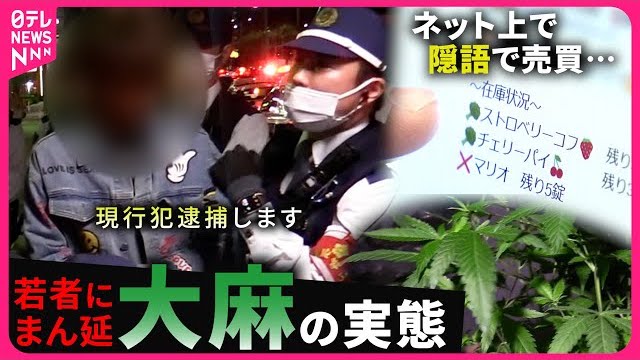FUKUOKA, May 13 (News On Japan) - Marijuana, long banned in Japan, now faces tighter restrictions after last year's law amendment prohibiting not only possession, but its use. Despite these laws, a quick internet search reveals numerous sale advertisements written in slang. Our investigation with the Health Bureau's Narcotics Control Department, colloquially known as "Matori," reveals the prevalent marijuana situation among Japan's youth.

At 1:45 PM, a raid in Fukuoka results in the arrest of a man in his 20s, exemplifying the drug's spread among local youth, often seen as an entry point to harsher substances. Our visit to the Kyushu bureau of narcotics control reveals the same investigative authority as the police, overwhelmed by keyword searches revealing extensive drug trade information.
Online, colorful emojis serve as codes -- broccoli icons represent marijuana, while names like Strawberry Cherry Pie may indicate specific strains. "Tegoshi," meaning hand-delivered trades, floods searches, indicating that face-to-face transactions are common in Fukuoka and nearby Hakata.
The rise of smartphones has made it easier for ordinary individuals, from students to housewives and office workers, to obtain drugs out of curiosity. Fukuoka Prefecture Police report that drug-related arrests have hit a record high this year, with 478 individuals detained, 80% of whom are under 30.
One recent case involved a man in his 40s, caught cultivating marijuana in an apartment rented separately from his residence. The smell leaked outside, indicating large-scale operations. From the raid, officers confiscated marijuana plants equivalent to two carloads.
In Fukuoka, despite a crackdown, marijuana continues to circulate in the shadows. One arrested individual was also found possessing methamphetamine, suggesting that marijuana acts as a gateway drug.
Meanwhile, products containing CBD, a non-psychoactive component of cannabis, are mixed into coffee and sweets, offered in cafes without falling under the Narcotics Control Law. "We serve vegan food with CBD. It attracts health-conscious customers," said a cafe owner, illustrating the legal consumption of such products.
Despite the crackdown, the allure of marijuana remains strong among the youth, possibly equated to tobacco in their minds. "It's not really a bad thing," is a growing sentiment among them, influenced by fashion and admired musicians who mention drugs.
Yuto, a user since he was 16, talks about his dependency: "People say it's not addictive, but it becomes a part of your life, and quitting is incredibly hard." After deciding to quit, he described the following month as hellish, having once spent up to 200,000 yen in a month on drugs.
Now 26, Yuto was arrested for violating the Narcotics Control Act and received a suspended sentence. Since then, he has severed ties with drugs, but the amended law, which now includes using marijuana, still faces skepticism from experts who doubt it will fully address the issue.
The amended law aims to curb the rampant spread, but experts believe that solving the problem in a complex society targeting exhausted youth may have its limits. The roots of marijuana continue to spread, presenting an ongoing challenge.
Source: 日テレNEWS














